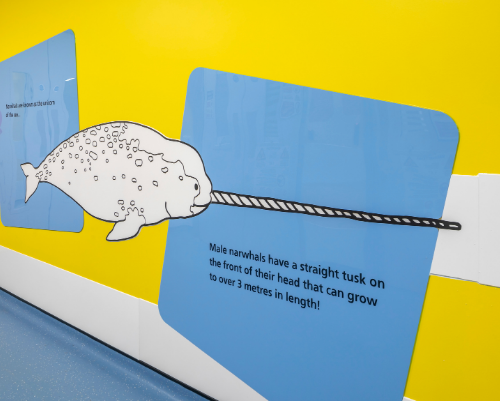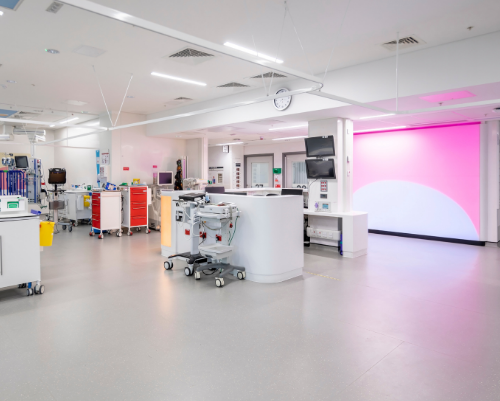
Sky has 2 sections
Sky paediatric critical care unit
Sky paediatric critical care unit has 10 beds and provides intensive care for critically ill children from south east England and beyond.
Sky cardiology unit
Sky cardiology is a unit with 18 beds providing care for children who are having heart surgery and interventions.
 Directions
Directions
From main reception, walk towards the back of the building. Turn left after the helter skelter, then left again before you reach the glass corridor. Pass through the double doors and take the 'big' lift up to the 6th floor.
Information for visitors: Sky paediatric critical care unit
Parents and carers can visit their child at any time.
Visiting hours for other visitors are 10am to 8pm.
No more than 2 visitors at the bedside at once to reduce infection risk.
We allow a maximum of 4 named visitors including parents and carers.
Visiting children must be supervised by an adult.
Please switch your mobile phone to silent. If you need to use it, please go to the parents' room. Filming is not permitted on the unit. Please ask permission before taking photos.
Always wash your hands when you enter or leave the ward to reduce the risk of infection. Removing your coat and outdoor clothing when you first arrive also helps prevent the spread of infection.
If you have been in contact with someone who has chicken pox, speak to the nurse in charge before entering the ward. Some of the children are very sensitive to infections.
Please call the unit about visiting if you have symptoms of cold or flu, or have diarrhoea or vomiting before coming in.
Information for visitors: Sky cardiology
Parents and carers can visit their child at any time.
No more than 1 visitor per bed at a time.
Please switch your mobile phone to silent. If you need to use it, please go to the parents' room.
Always wash your hands when you enter or leave the ward to reduce the risk of infection. Removing your coat and outdoor clothing when you first arrive also helps prevent the spread of infection.
If you have been in contact with someone who has chicken pox or measles, speak to the nurse in charge before entering the ward. Some of the children are very sensitive to infections.
Please speak to your nurse about visiting if you have symptoms of cold or flu, or have diarrhoea or vomiting before entering the hospital.
Accommodation for parents and carers
 Sky paediatric critical care unit
Sky paediatric critical care unit
We do our best to accommodate up to 2 parents and carers as comfortably as possible while your child is on Sky ward. However, there are a limited number of rooms available which are allocated on a day-by-day basis and cannot be reserved in advance.
If we cannot accommodate you in one of these, there are other places near the hospital where you can stay. See our accommodation page for more information.
Sky cardiology
There is a pull down bed at each bedspace for 1 parent to stay overnight.
Room for parents and carers
We have a room in which you can relax. You can make tea or coffee, and there's fridge in which you can store your own food. Please label it with your child's name and bed number.
There is also a television and parents' information screen. This room is for parents and carers only so we ask that no patients are taken in there.
Meal times
For children who are able to eat, we provide cereal and toast for breakfast, and a hot meal or light snack for lunch and dinner.
If your child is unable to eat during their stay, they are reviewed by the dietician and are fed a milk feed either by bottle or by a special feeding tube.
Sky paediatric critical care unit parents and carers
Meal vouchers are provided for breastfeeding mothers (or those expressing their milk) which you can use at any of the hospital's catering facilities.
Sky cardiology parents and carers
All breastfeeding mothers will be provided breakfast, lunch and dinner.
 Your nurse
Your nurse
At the start of each shift, your child will be allocated a nurse who will introduce themselves to you. This is the best person to ask if you need help, but please don’t hesitate to ask another member of staff for assistance.
Your doctor or advanced nurse practitioner
The doctors and advanced nurse practitioners involved in your child's care do 2 ward rounds a day, usually in the morning and afternoon. This is a good time to ask questions.